Read The Docs
Features
Static Generators
Read The Docs (RTD) is a documentation generator that utilizes either Sphinx or MkDocs to generate the documentation site and theme, depending on your choice. The RTD GitHub houses the configurations and files that generates the Official Website. This provides a good example of the many features RTD offers, and allows you to step through configurations in a more feature-rich and complete setup.
Since there are different choices for the backend static site generator, the deployment procedure is different depending on which one you choose. Below, we will cover deploying Read The Docs with Sphinx and MkDocs. These two sections are each entirely different deployments of RTD, where the difference is only the Backend Static Site Generator that is used to build your documentation.
Alternatively, you can simply sign up on the RTD official website and allow them to host the documentation for you by linking a repository to your user account and following the Quick Start Instructions. Since this is nearly turn-key, we won't cover deploying RTD this way.
Continuous Version Based Documentation
RTD utilizes webhooks within your VCS (GitHub, GitLab, BitBucket) to automatically build and deploy version-based documentation for your projects. If you've deployed a project to RTD, it automatically creates these webhooks for you. See the Webhook and Automation documentation for more info.
There are also two independent versions of RTD, one community and one for business related documentation that also supports private repositories and other security features. When visiting https://readthedocs.org, we are viewing community version. When visiting https://readthedocs.com, we are viewing the business version.
For the below documentation, we will be using the Community Version of Read The Docs since the business version is Subscription Based.
Downloadable Documentation
RTD supports downloading any hosted documentation in PDF, ePub, and Zipped HTML formats.
Text Search
Need a place to host your Sphinx docs? readthedocs.org hosts a lot of Sphinx docs already, and integrates well with projects' source control. It also features a powerful built-in search that exceeds the possibilities of Sphinx' JavaScript-based offline search. - Sphinx
RTD adds search functionality to your documentation that, in comparison to the sphinx builtin search capabilities, is a noteworthy improvement.
RTD with MkDocs
Deploying RTD with MkDocs is as simple as first deploying a MkDocs instance, and then importing this documentation into RTD. The RTD documentation provides instructions for Getting Started with MkDocs, which outlines the process below.
Install MkDocs
MkDocs supports Python versions 3.5, 3.6, 3.7, 3.8, and pypy3. If you have and use a package manager (such as apt-get, dnf, homebrew, yum, chocolatey, etc.) to install packages on your system, then you may want to search for a "MkDocs" package. If your package manager does not have a recent "MkDocs" package, you can still use your package manager to install "Python" and "pip". Then you can use pip to install MkDocs. - MkDocs Official Documentation
The quote above seems to suggest the preferred method for installation is pip, though it is possible to use your package manager. To make these instructions more portable, I'll only cover mkdocs installation using pip.
sudo apt update && sudo apt upgrade
sudo apt install python-pip -y
pip install --upgrade pip
sudo pip install mkdocs
MkDocs Man Pages
If needed, MkDocs provides man pages that can be installed with click-man by running the following commands
An explanation on why the man pages are not installed automatically with pip install mkdocs is described within the click-man GitHub README
pip install click-man
click-man --target path/to/man/pages mkdocs
Following the Man Pages Index Guidelines we can install the man pages to the appropriate section using the following command
click-man --target /usr/share/man/man1 mkdocs
Now we can see that the man pages for mkdocs have been installed and reference them as needed directly within our terminal -

Configuring MkDocs
MkDocs offers a range of custom configuration options which can be tailored to suit your needs aesthetically and in terms of functionality. To get started, run the following commands
mkdocs new my-project
cd my-project
This will have created a new directory relative to your CWD ./my-project generated two files within, ./my-project/mkdocs.yml and ./my-project/docs/index.md. For this section, we will be modifying mkdocs.yml
site_name: My Docs
nav:
- home: index.md
theme: readthedocs
This adds a title for our documentation and says two things, we've created an ./my-project/docs/index.md that represents the home page content, and we want to use the ReadTheDocs theme for our instance of MkDocs. Now to apply these changes, we rebuild the documentation
mkdocs build
This generates raw HTML files within ./my-project/site, which will have the following file structure
These files do not need to be tracked by your VCS since they are generated, and if using git to track this MkDocs instance can be ignored with echo "site/" >> .gitignore
To update the generated file index with any removals or renamed pages, you'll need to run the following command
mkdocs build --clean
Once these files are updated, provided that you are working locally and hosting remotely, you can update your remote host with the new generated files -
mkdocs build
scp -r ./site user@host:/path/to/web/root
Alternatively, you can work directly on the host and serve the ./my-project/site directory directly.
Themes
MkDocs is very themeable, you'll notice with the screenshot below that the Windmil theme is quite different from the ReadTheDocs theme used on the RTD Documentation.
Plugins
Mkdocs supports plugins which extend the functionality in more specific use cases. Check the GitHub Wiki for a complete list of plugins.
This feature came from a request for multiple projects documentation within a single MkDocs instance - Issue #265. Once plugins were added to MkDocs, Spotify/mkdocs-monorepo-plugin provided a plugin to support this feature, allowing for multiple documentation folders within a single MkDocs. Spotify even hosts a Live Demo showcasing the results of using the plugin and has well-written instructions on how to use it.
Deploying MkDocs
The files generated with MkDocs can be deployed using either GitHub Pages, RTD, or a local webserver like NGINX or Apache. Below, we look at a simple NGINX configuration to serve MkDocs
user www-data;
worker_processes auto;
pid /run/nginx.pid;
include /etc/nginx/modules-enabled/*.conf;
events { }
http {
include mime.types;
# Redirect root domains
server {
listen 80;
server_name domain.com www.domain.com;
# Pass to SSL
return 301 https://www.domain.com$request_uri;
}
# SSL
server {
server_name domain.com www.domain.com;
server_tokens off;
listen 443 ssl;
ssl_certificate /etc/letsencrypt/live/domain.com/fullchain.pem;
ssl_certificate_key /etc/letsencrypt/live/domain.com/privkey.pem;
# Configure Server-wide logging
access_log /var/log/nginx/access.log;
error_log /var/log/nginx/error.log;
# Pass to container
location / {
# Point NGINX to static site files
root /path/to/my-project/site;
include proxy_params;
}
}
}
As a final step, we restart the nginx service and navigate to our domain in a web browser.
sudo systemctl reload nginx
For demonstration, I've duplicated this page within my mkdocs instance, shown in the screenshot below
You can even search for keywords right out of the box with the builtin search field -
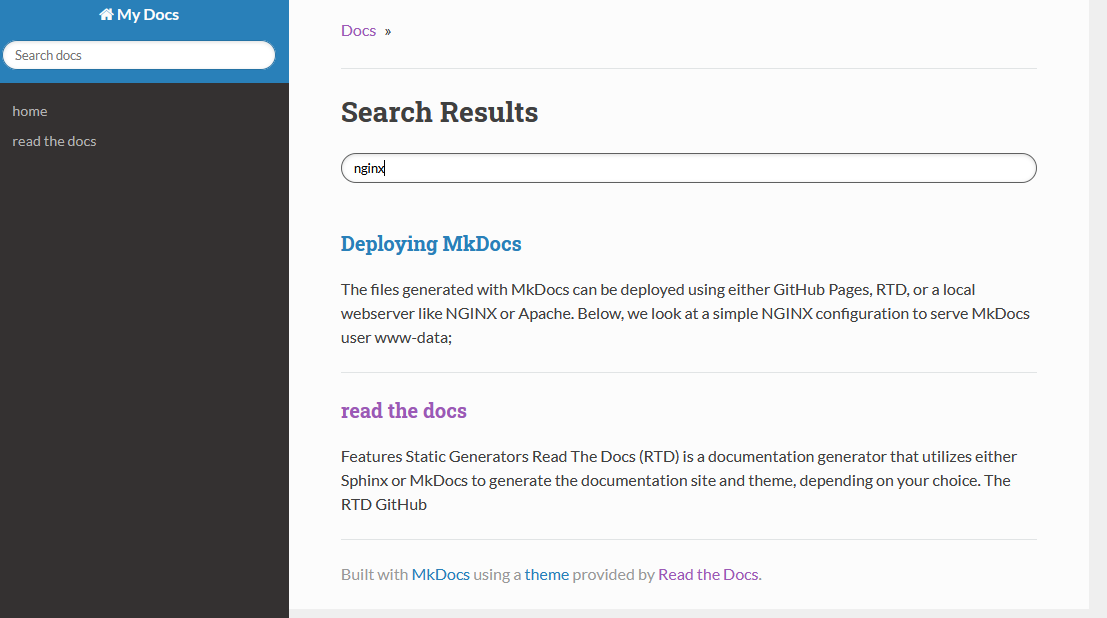
RTD with Sphinx
WIP

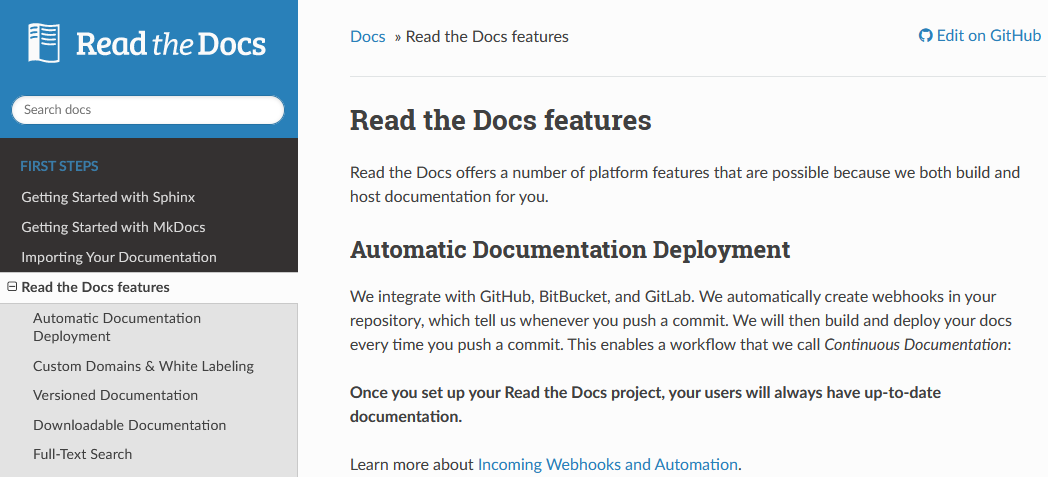
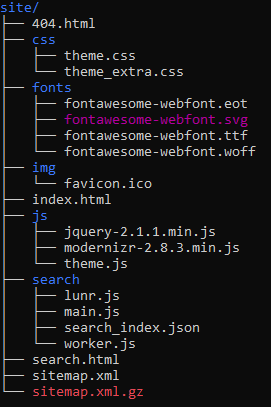
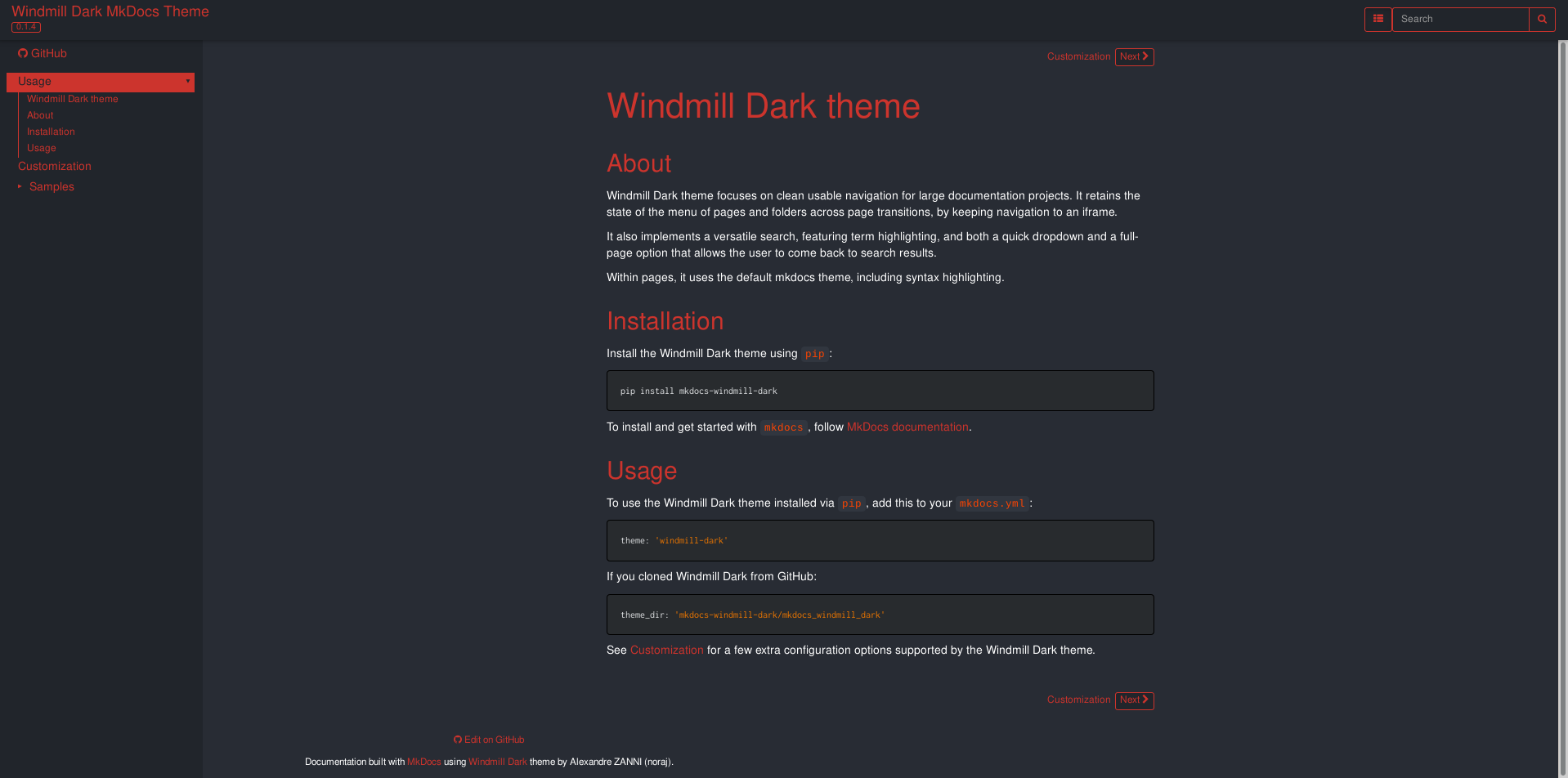
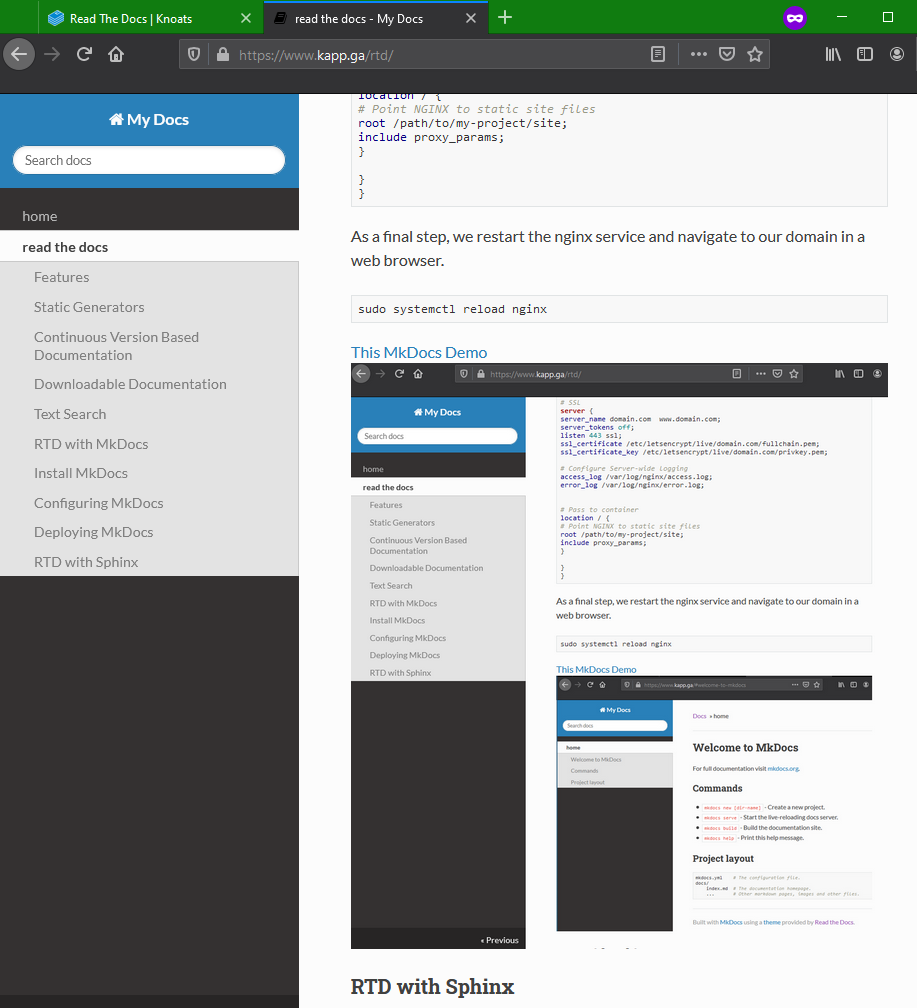
No comments to display
No comments to display